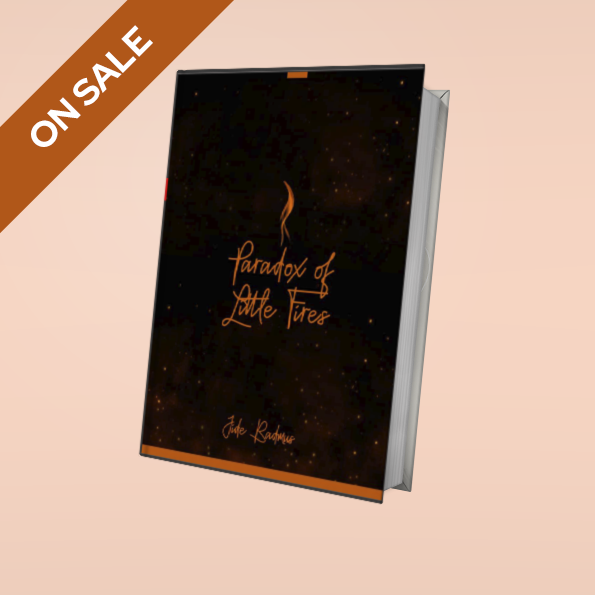Nket Godwin is a poet, critic, essayist and teacher. His works have been published in both online and print magazines and anthologies.
In a time when the thematic preoccupation of Nigerian (and by extension African) literature is trying to
wean itself from the more overt disillusionment poetics, poets like Jide Badmus have assiduously tilted
their arts towards a rather avant-garde subject, the erotic, with their voices echoing with reverberating
pulse in that pantheon. In this nascent thematic preoccupation, the need for language (metaphor) is as
focal as the subject, for, as Donatus Nwoga once said, language—metaphorically embellished—is what
drives the subject. In Paradox of Little Fires, although sensually thematized, the poet further sets out on
a quest for metaphor, being conscious of, and, as such, drawing the readers’ attention to its significance
in poetry. The collection is a call into a banquet of metaphorical sensation—flesh intertwining with
words, as well as words with flesh. Unlike his previous publications, There Is a Storm in my Head,
Scriptures, and Paper Planes in the Rain (co-authored), Jide turns towards language, not outside it, to find imagery.
In this collection, Jide often ends up reiterating, in lyrical aptness, the assertion that metaphor is the
soul of great poetry. Every poet strives for it. In Paradox of Little Fires, metaphor is a totem, as the poet
strives towards mentioning the un-mentionable without touching the readers’ consciousness with bare
palms of words, but with gloves of metaphor. The relationship between “Paradox” and “Little Fires” is
the rather unusual spark that is the result of two opposite bodies coming together—how can a body,
soft and containing fluid, generate such spark, without a matchstick or fuel? It is the bottled-up feeling
only let loose by the sensual hands/hearts of two lovers cut in coital war. “Fire” is simply a sexual
process, a feeling, emotion, desire, longing, etc., which binds two hearts. The poet, in “Under
Covers”, asks:
How did you light
the flare—feelings
I didn’t know were there,
emotions buried in the dark? (p. 20)
Containing twenty-six (26) poems, the collection is divided into three parts: Kindle (which contains six
poems), Ablaze (which contains seven poems), and Ghosts of Ecstasy (which contains twelve poems).
The first part, “Kindle”, gives the impression of a poet on the threshold of description, exposition, and
narrative of the [only] tale that a woman embodies. The quest for metaphor in this “Part” is an
infusion of the abstract and the concrete, the cognitive and the threadbare… Here, the quest is not
farfetched, as in “Ablaze”, where we have Biblical allusions: religious metaphors delineating bedtime
ecstasy. The poet rather scours his metaphors from the grammar of the language with which he writes.
The magic the poet does with grammar and linguistic imagery is intellectually gripping, giving the poems an embodiment of metaphorical avant-gardism. Take, for instance, the poem, “Punctuation”, in which
the poets starts with the lines:
This poem starts with a full stop
to lingering thoughts”.
One is, willy-nilly, propelled to mentally visualize the scenario the poet describes (or about to describe)
and the linguistic signification of “full stop”. There must be a moment when nothing seems to be
happening, then “lingering thoughts” on how, why, and when it will start; or a pause in-between
conversation to start the sensual fire. This is the poet binding grammar (as a language) with imagery (by
way of a concrete or an abstract symbol) to give an endearing metaphor. He goes further to assert:
You are poised as a question mark
—shall we explore the night, find
expressions beneath dark skins?
The “lingering thoughts” metamorphoses into “poised as a question mark”. One pauses and examines
the seductive poise of the other. The sexually-compelling disposition of the woman in question, perhaps,
is what forces the poet to inquire thusly. But, most importantly, one has to be conscious of the
grammatical significance of “question mark”. Here, the poet seems conscious of semiotics (an aspect of
style-cum-semantics), which is the sign (the hook-like sign) at the end of an interrogative sentence (?)
and the physical posture of the woman, who invariably must be standing, sitting or lying in a way that is
nothing short of being curved as the hook-like sign, and, thus, “sensual”: “poised as a question mark”.
Thus, the poet progresses, being now enmeshed in the play, to object:
Let’s start this conversation with lips
Curved as comas, defying syntax of emotion
Recall the title?—Punctuation. And you know what punctuations are in grammar: the frame of speech,
of writing (“conversation”). And conversation is a daily human activity. Its metaphorical implication here
is that sex is a daily human activity, as such. Applying it metaphorically to bring in outstanding imageries
(imageries that not only show mastery of language but a clear delineation of emotion and subject
matter) makes the poet a genius. But this verdict should not come in now, as the poet has more wonder
for us.
This quest, within linguistic domain, extends to the next poem. The poet, it must be asserted at this
point, is not only recollecting his metaphors within the domain of the language with which he renders
his poems but quite dexterously taps the readers’ consciousness of the semiotic significance of the
orthography of such language. This can, once again, be seen in the poem earlier analyzed, where the
poet says: “lips curved as comas”. Here, both the alliterating orthograph /c/, which is physically bent,
the word “curved” (which describes bend), and the shape of “lips”, which is naturally curvy, indicating
bend—even before and in the moment of kissing—show the whole impression the poet creates with the
use of “curved as comas”; two lovers lip-fondling. Coma is utilized to show a list of items. In this case,
progressive emotion; the endlessness of this aspect of our being.
It is perforce in the next poem, “Parenthesis”. Parenthesis is also part of the punctuations of a language.
Here, the poet seems to be interested in the woman’s physique in relation to that of the parenthesis.
The imagery the metaphor here conjures is that of the curvy shape of a woman’s hips and the way the
parenthesis is drawn. What an excellent thing to do with semiotics!
“You are a colony of curves”, (Parenthesis, line 1).
As mentioned earlier, the quest here is to seek a [metaphorical] glove with which to touch the
untouchable within the reader without arousing the consciousness that such has been touched. ‘The
erotic is a bizarre thing that we must stir clear of’, our religious beliefs, moral savviness, and sense of selves often lets us understand…even if that’s not the case. But here we are with Jide being dexterous with
metaphors. “Parenthesis” ends with the lines:
But the treasure I seek is trapped
Within your parenthesis of hips
The expression, “parenthesis of hips”, is evocative. Earlier, I conjectured that the expression attempts a
description of the natural, often sensually compelling posture of the woman: the hips that are curvy as
a parenthesis. But if one reads this poem repeatedly one would unveil another metaphorical subtlety
which the poet adorns the lines. Here, the word “parenthesis” seems to evoke a description; it gives an
imagic impression. Parenthesis entails two curves that make up a bracket. Also, a woman’s cunt, if
observed, seems to be in such a shape. And a man seeking treasure within such place: “parenthesis of
hips” shows that the poet, being handy with metaphor, is conscious of the convergence between
linguistic semiotics and the human/woman’s physique, and knows how to touch on the absurd. Hence,
“parenthesis”, which is, semiotically, an assemblage of two curves, gives a better imagic description of
the persona’s urge for sex—“treasure I seek”. In this metaphorically deviant collection, it seems, one
reads both linguistic semiotics and the semiotics of the human physique.
One hallmark of erotic poetry is the ability to stray the readers’ imagination within different horizons
without the literal knowledge of such within the readers. Using the word “literal” in relation to the
reader means that a reader of Jide’s [erotic] poetry must strive for the opposite; must be able to unravel
the riddle of metaphorical conjuration. It’s interesting to note that the cunt is located within the
woman’s hips.
It should be reiterated that one thing Jide seems to be doing in this quest for metaphor is being
conscious of semiotics. In another poem, “Ampersand”, the first sign that begins the poem is what the
title entails. The whole meaning or impression the poem tries to create is symbolically conveyed by
simply placing the ampersand at the beginning of the poem. This gives a visual perception of two lovers
folding, touching, caressing, and devouring each other in romantic sedation. How conscious and
intentional Jide is! This is a poem that narrates and or describes the process of lovemaking. The poem
starts with:
& this is the name I give
to what we do together
or to each other when
your contours complement my stiffness
Notice the repeated use of the ampersand (&). It’s not only a “name”, as the poet uses, but it’s actually
shown. The process of lovemaking, what I call the “pacific war on coverlet”, involves a sort of entanglement and twinning of arms, legs, lips, and bodies; more like the twist of the actual ampersand (&). What the poet calls: “conjunction of bodies”. Also, the metaphor here is grammatically tailored. The quest, it can be said, is recrudescent.
Under “Ablaze”, Jide’s quest for metaphor turns towards the religious, the spiritual. It is not an
accidental quest, as the poet lets us understand the spiritual leaning of sex, of sensual communion. The
poems read like the sermons of one possessed with the spirit behind the words with which he preaches,
as we find in “Pentecost”:
“I stand before your pulpit,
bold like an open Bible
head raised in supplication.
Go down on knees, consume
this offering with tongue of fire” (p.16)
Here, we are faced with a poet who is not only on a quest for metaphor, but the dialectical. The poet,
here, engages in the dialectic of the symbiosis between the sexual and the spiritual. Sex has often been
described as one of the easiest ways in which spiritual forces are transferred from one person to the
other. For those living in the riverine, who believe in the marine powers; especially mami water (water
goddess), known for sexually possessing its victims, sex is usually the means. However, here, Jide is not
dialecticizing myth, but rather the fact that sex is a sort of spiritual reinforcement. Let me quickly add that
the expression, “like an open Bible/ consume this offering with tongue of fire”, attests to the Biblical
drama between Prophet Elijah and the prophets of Baal at Mount Camel, when the prophet Elijah
commanded fire to consume his offering. The poet, in a quest for metaphors, travels as far as the epoch
of Elijah to bring allusive metaphors with which he defines sexual combustion on what I call “bed altar”.
Inasmuch as sex has a spiritual leaning, religion provides the poet with a convergence between language
(metaphor) and ero-poetics.
However, Biblical words are not the only words with which the poet unbinds his emotion. This can be
found in the contrast between the grammatical imageries in the first section of the book and the other
parts. In “Ablaze”, for instance, the poet turns toward metaphor of combustion. One poem I would like
to quote in full here is, “The Arsonist Poem”. In this poem, although the sexual desire is synonymous
with “fire”, the motive, as underscored by its undertone, is of socio-ethical significance. Of course,
arson is a crime. This crime, from emotional/sexual base, is socio-ethical, almost equal to the distinction
between love and lust. It reveals how we often substitute love for lust. Being an “arsonist” poem, it is
built on the moral ethos which negates lust; how deluded we always seem in its face; or the realization
of it when the deed is already done. When this is the case, it merely “burns eager palate/in the same
breath” (“Little Fires”). Read:
In this poem, a house
is torched from within.
On this couch, fully
clothed, we smooch,
wick & matchstick
—wet & excited.
In this poem,
I’m a cardboard house.
You will come inside
& touch me with
flaming lust, send us
reeling into coital fires.
The poet further offers respite in “Avoiding Heartbreaks”. Often, when lovers realize it’s been lust and
not love, it is usually not only about the crime “arson”, but the effect (‘heartbreak’), for the heart
already becomes the house that is set on fire—which the crime is committed against. It is important to
mention that in this collection, “fire” is a metaphor for the enthusiasm, the passion, the desire and
longing which binds two hearts. It is also the negative effect of lust, of heartbreak; hence, crime against
emotion. The poet writes:
When the flame starts
to wane, start to wean
your heart,
feed it
with bone—teach it
to stand on its own
This is necessary for fire is destructive, as the poet discloses under the third part of the collection:
“Ghost of Ecstasy”. Here, the poet, having journeyed home now, brings the moral of his quest. Love is
not always what we think it is. It is as mysterious as the “city in ruins”, which the persona’s lover in
“Layers” reveals.
In this collection, intent to scour the dynamics of language, metaphor, and imagery; grammar offers the
poet the succor. To read Jide in this collection, one needs his/her understanding of the grammar, the
English orthography, cast in its semiotic plains. Here, Jide further exposes the power of poetry in
demystifying language, while, at the same time, marveling his readers.
Contributor’s Bio
Nket Godwin is a poet, critic, essayist and teacher. His works have been published in both online and print magazines and anthologies. He’s the author of the chapbook, Sexperimenting Verses. He writes and teaches in Port Harcourt, Rivers State.





